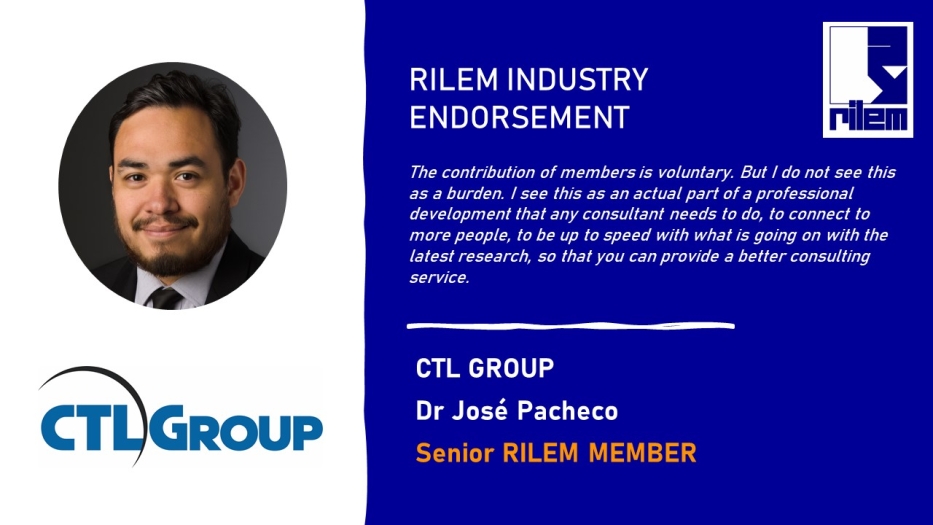News

Endorsement from CTL Group


Dr Jose Pacheco is Principal&Group Director of Concrete&Cement-Based Materials at CTLGroup in Skokie, IL, US. Dr Pacheco has been a RILEM senior member since 2015. He has been active in several RILEM Technical Committees (TCs), such as, 235-CTC: Corrosion initiating chloride threshold concentrations in concrete, 262-SCI: Characteristics of the steel/concrete interface and their effect on initiation of chloride-induced reinforcement corrosion, 270-CIM: Benchmarking Chloride Ingress Models on Real-life Case Studies: Theory and Practice, 281-CCC: Carbonation of concrete with supplementary cementitious materials, 285-TMS: Test method for concrete durability under combined role of sulphate and chloride ions.
The CTLGroup is an engineering, architecture, and materials science consulting firm with over 100+ years of history as it was formed after the research laboratories of the Portland Cement Association (PCA). CTLGroup’s laboratory facilities are internationally recognized as one of the most comprehensive testing and research facilities in cementitious materials, chemical admixtures, mortars, construction products and structural systems
The interview below was offered by Dr Pacheco from his office in Illinois on 17 Nov 2020.
*********************************************************************************************************************************************************************************************************************
RIM: Thank you Dr Pacheco for your time today! I noticed that you are a RILEM member as well as a ACI (editor’s note: American Concrete Institute) member. I would be interested in knowing which are the differences, according to your experience, between sitting in a RILEM TC and sitting in an ACI committee.
Dr Pacheco: Well, my first experience in a technical committee was with RILEM while I was doing my PhD research. The way they are set up is more a fast-track approach where a committee forms for about 5 years and it addresses any specific topic on whatever research interest the TC Chair and Deputy-Chair may have. People join in or they are invited to participate. That is very engaging because anyone that is involved in that particular committee knows that we are addressing one single issue and that only issue at that particular time in that committee. After 5 years, depending on how the committee goes, there could be some publications, even conferences or some sort of events publicizing the research outcomes and that give a platform for people who had participated to elaborate on their own findings and professional opinion of the topic. In ACI, the structure is different: there are long standing committees that address a topic but in a more general way. There are task groups and specific fast-track opportunities within ACI that are somehow similar to RILEM. For instance, there is a long-standing “corrosion” committee in ACI that has recently established a task group addressing something very similar to what I was doing in my RILEM 235 committee (editor’s note: Dr Pacheco refers to TC 235-CTC: Corrosion initiating chloride threshold concentrations in concrete) almost 8 years ago. So that was part of the reason why I think they are different approaches to research studies and industry views on certain topics. The balance of people in the committee is also different: whereas in RILEM is mostly academics and people that in some way are involved in commercial research or research institutions; ACI has a broader landscape where there are people that are engineers, researchers (obviously!), manufacturers, people representing owners like the government of some organisation that do not have the research interest in itself but they are part of the industry.
RIM: Would you say it is “more fun” in RILEM than in ACI? Maybe because of the fact that you know you are working in a self-contained topic and you know you are working with researchers like yourself and maybe there are less commercial issues to which you might not be necessarily interested…
Dr Pacheco: For me, as an industry member, the approach that ACI has is more related to my day-to-day basis/work. The work that I do is based on fundamental research and advanced degree of understanding of certain things about concrete. That is very important to me. The part that I like about RILEM is related to my research-oriented mind where I can really dive deep in into specific topics. I think that RILELM is great at that! When I was sitting in RILEM TC 235-CTC there were a few people that were not in university settings. My PhD advisor, Rob Polder, for instance, was with TNO for a long time so I always had this interest in bringing the understanding of what is happening in a laboratory setting to what happens in a structure in the field. These are two completely different environments! I think RILEM has a great reach to researchers not only in Europe but through the world. I mean, RILEM Annual Week travels through all continents, I believe. People that I know from the US, like Jason Weiss for instance, or Jason Ideker, Burkan Isgor, all of them are from Oregon state, are some of the handful of people that are active in RILEM but they are also academics, they are researchers at the universities. I am still very fond of RILEM. I think it has a long way to go in terms of the work that it does and the outreach that it has. I want to help with this industry endorsement because I think that somehow there is a misunderstanding of what RILEM actually does and people believe that it is only for researchers or only for people in the universities, where actually it is not! It is very rewarding for people that are in consulting like I am, or people representing owners. I remember Joost Gulikers, for instance, from Rijkswaterstaat in The Netherlands. He represented the Ministry of Infrastructure and he was always involved in RILEM. There is a certain amount of people that have a connection with what RILEM does and what its mission is that are not necessarily in a research setting. I think that for them, they would agree with me, RILEM is a very good place to participate and to be a member of.
RIM: That is great! Thank you so much!
Dr Pacheco: I hope it answered the question.
RIM: of course, it did! Like for all RILEM members, also your work is based on a voluntary basis. It means that when you stop working as a consultant you start to work as a RILEM member...
Dr Pacheco: Yes! It is my hobby! 😊 I think this is the same for everyone. Even with ACI it is the same: the contribution of members is voluntary. But I do not see this as a burden. I see this as an actual part of a professional development that any consultant needs to do, to connect with more people, to be up to speed with what is going on with the latest research, so that you can provide a better consulting service to your clients. Overall I think that, in the settings that RILEM has, what I have always appreciated is that it is very focused on the science and what the actual results are. It is less affected by “interests”, like trying to get some kind of lobbying process going on. It is more a group of people sharing common interest and looking at it from different angles to try to solve it. It is more like one of those “police detective shows” from the TV in which they are solving a crime which is really fun and engaging! Sometimes you can get broken down with bureaucracy and other things but I think RILEM in itself has a lot to offer. Its reach spreads out globally. The RILEM Annual Week in going to be in Mexico next year…
RIM: Are you Mexican?
Dr Pacheco: Yes, I am! The last RILEM week that I attended was in 2018 in Delft and it was a good excuse to go back (editor’s note: Dr Pacheco was awarded his PhD in 2015 from TU Delft).
RIM: I really like this image of RILEM members as a group of detectives and the research outcomes as the “solving the crime”…
Dr Pacheco: Sometimes the crime cannot be solved! That is what actually happened with TC 235-CTC. Let’s put it this way: we were not able to solve the crime the way we wanted and then this new committee that Ueli Angst and Mette Geiker started (editor’s note: RILEM TC 262-SCI: Characteristics of the steel/concrete interface and their effect on initiation of chloride-induced reinforcement corrosion) contains many members of TC 235 that continued working on this topic plus new members that is always exciting. I am really looking forward to seeing what the next committee is going to be about, how it is going to be formed and all of that!
RIM: I would like to close with just one last question if you do not mind. Can you give me an example of when RILEM helped you with a consultancy job or with some issues on a project? In other words, do you remember an occasion in which there were no standards or guideline on a certain problem and a particular RILEM recommendation or publication helped you with your job?
Dr Pacheco: There is a ton of them! I am trying to think about a recent one, but before this, let me say something: one of the greatest benefit of being a RILEM member is to have access to the Materials and Structures journal and to be able to get a hold of the RILEM Proceedings. They have a ton of great information. Since I am in a corrosion-type industry position, there is a bunch of RILEM documents that I have here (editor’s note: at this point Dr Pacheco was literally looking at his bookshelves in his office to read the titles) that helps me tremendously with my career. I refer to the work published by Dr Carmen Andrade and Dr Maria Cruz Alonso from Spain, work from Luping Tang from Chalmers University, I do not want to miss anyone but once you start… obviously my PhD adviser Rob Polder, and the group of people that he has always worked with: Ueli Angst , late professor Luca Bertolini… I am sorry if I am missing someone.
RIM: It’s ok! 😊 you are right! As a RILEM member you have access to basically all publications, including the Proceedings published by Springer (electronic version).
Dr Pacheco: There are a few that I actually like to buy in print because I still prefer to read a book than an electronic file. I have here my collection of RILEM books and papers!
RIM: If we can travel to Merida next year (editor’s note: the 75th RILEM Annual Week in 2021 in Merida, Mexico, is organised as a hybrid - on-line and in person - conference), you will have the opportunity to see many RILEM books exposed at the RILEM desk during the event.
Dr Pacheco: Hopefully we will have the opportunity to meet again in person as this is something that everyone is missing.














No comment
Log in to post comment. Log in.